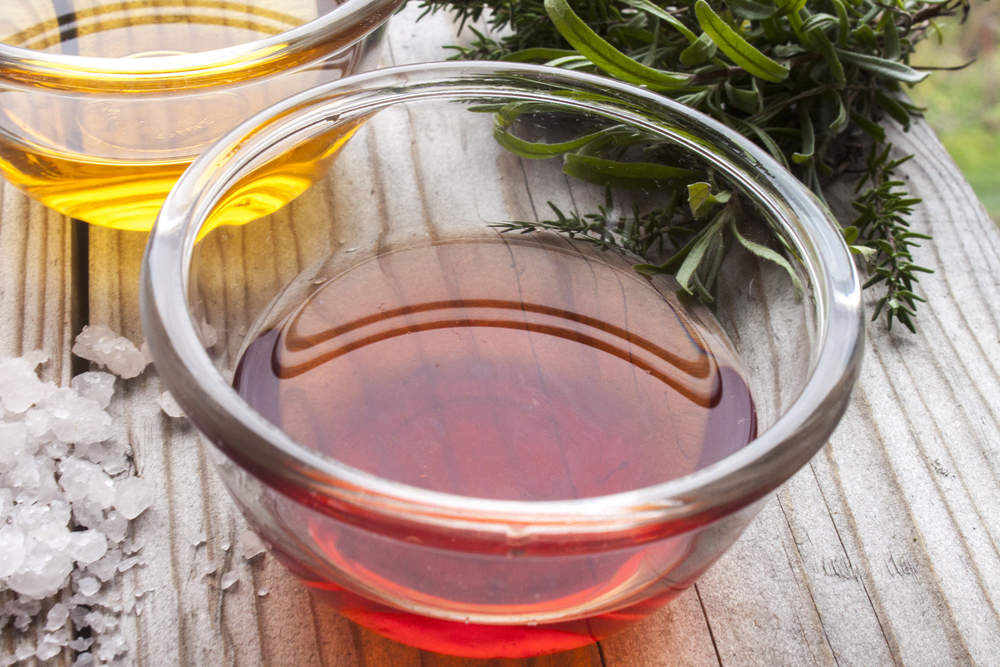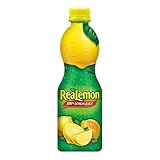Red wine vinegar should be a staple in your kitchen. Used in marinades and homemade dressings, it has dozens of uses. And it’s good for you too!
Yes, red wine vinegar is considered vegan. However, the manufacturing process of this vinegar brings about a few questions about the ingredients used to clarify the vinegar, as well as whether non-vegan products might be made in the same facility. Some of the best alternatives to non-vegan red wine vinegar are apple cider vinegar or lemon juice.
The only way to know for sure if your product is vegan is to either make it yourself from unquestionable ingredients and processes or look for organic, vegan-certified vinegar. We will explore how red wine vinegar is made, its health benefits, and some common red wine vinegars on the market. Let’s dig in!
Contents
How is Red Wine Vinegar Made?
When you look at the nutrition label of quality red wine vinegar, you will see one ingredient: red wine vinegar. To explore its vegan nature, we must first look at how it’s made.
Red wine vinegar is pretty simple to make. You can do it at home if you like. Take a bottle of wine, add some water, and then add a live culture. Some brands of apple cider vinegar from the store have live cultures. It might say “with Mother.” Cover this with a cheesecloth and let it sit in the air for some time.
The Mother needs alcohol to grow and will start to turn it into acetic acid. After a while, you might see a blob on top that looks like it’s made of gelatin. This is called the vinegar SCOBY or the “Mother of vinegar.” This means that everything is going well!
Once nearly all alcohol is gone, high-end vinegar makers put the product into barrels to age. Filtration occurs, the vinegar is bottled and then sold.
The Clarification Process’ Impact on Red Wine Vinegar Being Vegan
One of the steps in the red wine (or any wine) making process is clarification. This separates the sediment from the clear liquid you see in the bottle. There are many ways this can happen.
Non-Vegan Clarification Process
- Isinglass can be added to the wine to speed up the clarification process. Isinglass is a substance obtained from the swim bladders of fish. It is a form of collagen used for the clarification or fining of some beer and wine. If a winemaker uses Isinglass, the wine is not vegan.
- Using egg whites is a way of clarifying wine, but not commercially. Egg whites are made of albumin and globulin, which are positively charged. This bonds to the particles and tannins in the wine, which then sink to the bottom. This is not vegan.
Vegan Clarification Process
- During the aging process, sediment naturally settles to the bottom of the container. Fine red wine vinegars age in barrels, and then the vinegar is siphoned off the top or poured through a cloth. This is vegan.
- Wine and vinegar makers can use a pectic enzyme, which breaks down the structure of pectin in the fruit (grape) and keeps the wine clear. This process is vegan.
- Bentonite is a form of volcanic ash. It draws the floating particles to the bottom of the container. This is vegan.
The only way to know which process the vinegar maker uses is to ask. If you are a strict vegan, check the labels and buy from reputable producers. Check for a vegan label. (Note: In my research, none of the red wine vinegars were labeled vegan. If this is an issue for you, check with the manufacturer.)
The Manufacturing Process
The other thing that might bother vegans is if the vinegar is manufactured in a facility that also makes non-vegan products. Particulates in the air could contaminate the vinegar. The only way to be sure that this contamination doesn’t occur is to get assurances from the producer.
Is Red Wine Vinegar Good for You?
Red wine vinegar has several health benefits:
- Red wine vinegar can slow your digestion of carbohydrates and help increase your absorption of glucose. As a result, you may experience lower blood sugar levels.
- Red wine vinegar is full of antioxidants that may fight bacterial infections and reduce skin damage. Two of these are resveratrol and anthocyanins. Antioxidants can also relax blood vessels and increase calcium in your cells, which improves circulation and lowers blood pressure.
- Red wine vinegar contains acetic acid that increases fat burning, reduces appetite, and reduces fat storage. It may aid in weight loss when paired with a healthy diet and exercise.
Uses for Red Wine Vinegar
Red Wine Vinegar is versatile. It can be used in salad dressings, marinades, or reductions. Pair it with tofu and vegetables for added zing.
Many use red wine vinegar in their personal care routine as well. Dilute it as a facial toner or sunburn reliever, or add it to a bath with Epsom salt and lavender to soothe your skin.
Red Wine Vinegar Nutrition
Quality red wine vinegar has one ingredient: red wine vinegar. The differences between one vinegar and the next include the type of wine, the methods of production, and the amount of time it is spent in the aging process. Some vinegars use wines from a specific grape-growing region, such as Tuscany. Some are aged in oak barrels for several years to earn the “aged” stamp.
There is even a red wine vinegar that is specially made to drink. It’s made in small batches with infusions from flowers, aged in barrels for up to ten years, and filtered through high-quality linen.
Colavita Aged Red Wine Vinegar
Many red wine vinegars are made in Italy, and Colavita is one of the more well-known brands. They specialize in vinegars and oils. The Aged Red Wine Vinegar is produced with traditional methods of aging selected wines for long periods in wooden barrels. It is gluten-free.
Ingredients:
- Red Wine Vinegar
Nutrition Facts (per 1 tablespoon):
- 3 calories
- 0g fat
- 0mg sodium
- 0g carbohydrates
- 0g protein
Madhava Organic Red Wine Vinegar
Madhava Foods specializes in clean and simple foods. Their products are part of the Clean Label Project for purity, pesticide-free, and antioxidant superiority. They are non-GMO verified and organic. Their wines are sourced from local organic and non-GMO farmers.
Ingredients:
- Organic Red Wine Vinegar
Nutrition Facts (per 1 tablespoon):
- 3 calories
- 0g fat
- 0mg sodium
- 0g carbohydrates
- 0g protein
Heinz Gourmet Red Wine Vinegar
Heinz has been a well-known brand since 1869. They make a lot of products, including red wine vinegar. This is the first one I saw that is not pure red wine vinegar but diluted with water. They also produce this on a factory level, so the concerns about wine processing and purity are valid. Most wines have sulfites, so if you are sensitive, you will want to be cautious.
Ingredients:
- Red Wine Vinegar, diluted with water to 5% acidity
- Sulfites
Nutrition Facts (per 1 tablespoon):
- 0 calories
- 0g fat
- 0mg sodium
- 0g carbohydrates
- 0g protein
Star Red Wine Vinegar
This is another red wine vinegar commonly found in supermarkets. It is an aged and filtered vinegar made through the acetous fermentation of a select blend of red wines. It is sodium-free, fat-free, cholesterol-free, trans-fat-free, low carb, gluten-free, and has no sugar added.
Ingredients:
- Red Wine
- Vinegar
- Water
- Potassium Metabisulfite (a preservative)
- Diluted with water to 5% acidity
Nutrition Facts (per 1 tablespoon):
- 0 calories
- 0g fat
- 0mg sodium
- 0g carbohydrates
- 0g protein
Alessi Red Wine Vinegar
Product of Italy. Made from wines from the region of Tuscany. Only uses high-quality wines.
Ingredients:
- Red Wine Vinegar
Nutrition Facts (per 1 tablespoon):
- 0g fat
- 0mg sodium
- 0g carbohydrates
- 0g protein
Allergy warning: sulfites
Filippo Berio Red Wine Vinegar
This company specializes in olive oil, vinegars, pesto’s, and glazes. They are organic and certified kosher.
Ingredients:
- 100% Italian Red Wine Vinegar
Nutrition Facts (per 15 mL):
- 0 calories
- 0g fat
- 2mg sodium
- 0g carbohydrates
- 0g protein
Alternatives
Apple Cider Vinegar
Drink a shot with some water or add it to a salad dressing for amazing health benefits. Bragg Apple Cider Vinegar is USDA Certified Organic, Non-GMO, and Kosher. It contains a “mother” for added nutrition.
Bragg Apple Cider Vinegar
- Certified Organic Raw Apple Cider Vinegar
- Filtered Water
Nutrition Facts (per 1 tablespoon):
- 0 calories
- 0g fat
- 0mg sodium
- 0g carbohydrates
Lemon Juice
Freshly squeezed lemon juice is wonderful on salads and in drinks as well. Squeezing a fresh lemon is best, but you can also have on hand a bottle of 100% lemon juice. The three sodium ingredients are preservatives. Be alert if you are have a sensitivity to sulfites.
Realemon 100% Lemon Juice
- Lemon Juice from Concentrate
- Water
- Concentrated Lemon Juice
- Sodium Benzoate
- Sodium Metabisulfite
- Sodium Sulfite
- Lemon Oil
Nutrition Facts (per 1 teaspoon):
- 0 calories
- 0g fat
- 0mg sodium
- 0g carbohydrates
Related Questions
Does Red Wine Vinegar Contain Alcohol?
Food-grade vinegar is always made from alcohol. When the vinegar reaches .2 to .4% alcohol by volume, it is bottled. This amount gives it a good flavor, but it’s not enough to absorb into your body and make you intoxicated.
Is Old Wine that Tastes Sour Red Wine Vinegar?
If you buy a bottle of red wine and don’t drink it all, is that vinegar. While it has a sour taste and it might be on its way to becoming vinegar, it’s going to take quite some time. Eventually, yeast floating in the air will make its way into the wine and form a SCOBY. This is called wild fermentation, and precisely the way vinegar was made in ancient times.
Does Red Wine Vinegar have Allergens?
Sulfites are added to most wines to maintain freshness and prevent oxidation. It’s also a food preservative that prevents discoloration. Some people have a sensitivity that results in headaches or breathing difficulties. If you make your own vinegar, you can choose a sulfite-free wine. No vinegar specifically said they were sulfite-free, but some did list sulfites on their labels as an allergen.
Is Red Wine Vinegar the Same as Red Cooking Wine?
No, red wine vinegar is a red wine that has been allowed to sour and creates an acidic taste. Red cooking wine and red wine vinegar will create two completely different flavors in your recipes.


